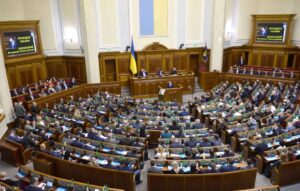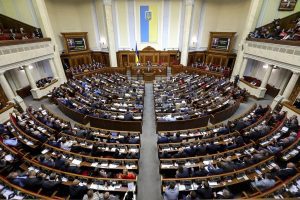
The Verkhovna Rada of Ukraine has suspended Chairman Dmytro Razumkov from conducting plenary sessions of parliament for two plenary sessions.
The relevant decision at the Tuesda meeting was supported by 240 MPs, of which 200 MPs were from the Servant of the People faction. The For the Future and Dovira factions gave 16 and 18 votes in favor, respectively, the Holos faction and the non-factional deputies gave three votes each.
However, ten MPs from Holos, one MP from Dovira, six MPs from Servant of the People, some 18 MPs from Batkivschyna, some 24 MPs from the Opposition Platform – For Life, all 27 MPs from European Solidarity and nine non-factional parliamentarians voted against such a decision.
First deputy head of the Servant of the People faction Oleksandr Korniyenko said during the consideration of this issue that this is due to Razumkov’s refusal to put to the vote of the conciliatory council on Monday proposals on the agenda of the plenary sessions of October 5 to October 8.
“We believe that by such actions, Chairman of the Verkhovna Rada Dmytro Razumkov, neglected the right of parliamentary factions to submit proposals to the weekly agenda of plenary sessions, which is a gross violation of the rules of Procedure of the Verkhovna Rada of Ukraine. The deputy faction of Servant of the People, For the Future and Dovira […] make a proposal to remove the Verkhovna Rada chairman from the holding plenary sessions for two plenary days,” Korniyenko said.
Razumkov declared a conflict of interest and instructed First Deputy Chairmna Ruslan Stefanchuk to conduct the plenary session when considering this issue.
“For two years in this room, we worked so that the law was the same for everyone. You can move in two ways: follow the law or according to political expediency. Today I see what is happening in the room. And if there is a desire to follow the second [way] rather than by law, is the right of MPs. I will not convince anyone, everyone in this room is adults, smart people,” Razumkov said.
“If there is a desire to change the Verkhovna Rada chairman, I said that I would not delay this process. As soon as the application was received, we issued signature lists, in the evenings we received an application for the launch of the procedure, immediately, according to the Regulations, it was launched, but I think that not everyone is happy with this. You need to quickly. So, you can do whatever you want in this room,” he said.
Razumkov also said the position does not matter to him: “This is a tool. Even without a position I will be able to implement everything that we promised in 2019.”
The Holos party called the dismissal of Razumkov another violation of the rules of Procedure of the Verkhovna Rada and an attempt to take parliament under the control of the President’s Office.
“The chairman was dismissed from his post while the issue of his resignation was being considered, for two days. This happened with a gross violation of the law. There was no argumentation regarding the chairman’s resignation, as well as all opposition factions. But, unfortunately, we have some colleagues cooperating with the President’s Office, and they gave votes for the dismissal of Razumkov,” leader of Holos Kira Rudyk said.
According to her, despite the fact that Razumkov started his political life as a representative of the pro-government team, the party opposes his resignation, as he follows the rules.
“If the chairman is replaced, the opposition will have half or even three times less opportunities to defend its position not only from the rostrum, but also directly with journalists. Since the so-called law on oligarchs is to be signed soon, which is unconstitutional, this is another reason why they want to replace the chairman so quickly,” Rudyk said.
As reported, Head of the Servant of the People parliamentary faction David Arakhamia sent a letter on behalf of the parliamentary faction recalling the chairman of the parliament. President of Ukraine Volodymyr Zelensky called the issue of Razumkov’s tenure as chairman of the Verkhovna Rada “intra-factional.”

The Verkhovna Rada at a session on Thursday supported the resignation of Interior Minister Arsen Avakov.
Some 291 MPs voted for the corresponding decision.
As reported, Avakov on Tuesday submitted a letter of resignation from office.
Avakov headed the Ministry of Internal Affairs of Ukraine since February 27, 2014. For the first time, he was appointed to a post in the government under Arseniy Yatsenyuk (2014-2016). Later, Avakov was a member of the governments under Volodymyr Groysman (2016-2019), Oleksiy Honcharuk (2019-2020) and Denys Shmyhal (2020-2021).

The Verkhovna Rada of Ukraine has canceled the Crimea free economic area, which was introduced by law in August 2014.
The adoption of relevant bill No. 5502-d on recognizing as invalid the law of Ukraine on the creation of a free economic area “Crimea” and on the specifics of performing economic activities in the temporarily occupied territory of Ukraine and on amending some legislative acts of Ukraine was supported by 328 MPs.
“Taking into account the circumstances that operated in 2014, the law, in fact, introduced preferential conditions for the continuation of economic activities in the temporarily occupied territory. At the same time, the law regulated the implementation of the rights of Ukrainian citizens who remained to live in the temporarily occupied territory and introduced additional restrictions (in particular, customs), in the tax legislation such citizens were equated to non-residents,” the government said in the explanatory note.
The authors of the bill said that such restrictions have led to discrimination against citizens of Ukraine who have remained to live in the temporarily occupied territory or are registered in this territory.
In particular, the status of non-residents led to restrictions on access to banking services in the territory controlled by Ukraine. International and national human rights organizations have repeatedly stated about the negative consequences of the law for the observance of human rights and freedoms.
In addition, bill No. 5502-d proposes to regulate the procedure for persons entering and leaving the temporarily occupied territory, securing the right to free secondary legal aid for Ukrainian citizens living in the temporarily occupied territory and ensuring the implementation of the right to inheritance for such persons.
The Verkhovna Rada at an extraordinary meeting on Thursday also supported bill No. 5501, which amends the Tax Code regarding the administration of taxes and fees in the temporarily occupied territory of the Autonomous Republic of Crimea and the city of Sevastopol, and bill No. 5503 on amendments to the Customs Code in connection with the adoption of the law on the abolition of the Crimea free economic area.
CRIMEA, FREE ECONOMIC AREA, PARLIAMENT, UKRAINIAN PARLIAMENT

The rate of value added tax (VAT) on livestock products, rye, oats, flax seeds and sugar beets, reduced from the beginning of the year to 14%, will be returned to the level of 20%.
An Interfax-Ukraine correspondent has reported that the Verkhovna Rada adopted bill No. 5425-d on Thursday with 309 supportive votes with the required minimum of 226 votes.
The 20% rate will again apply to products with tariff heading 0102 (live cattle), 0103 (live pigs), 0104 10 (live sheep), 0401 (in terms of whole milk), 1002 (rye), 1004 (oats), 1204 00 (flax seeds), 1207 (seeds and fruits of other oilseeds), and 1212 91 (sugar beet).
At the same time, with respect to other grains and oilseeds, the VAT rate remained 14%. In particular, these are goods with codes according to tariff heading 1001 (wheat and meslin), 1003 (barley), 1005 (corn), 1201 (soybeans), 1205 (rape seeds) and 1206 00 (sunflower seeds).
As the head of the specialized agrarian committee Mykola Solsky said earlier, the idea of lowering prices and reducing tax violations at a reduced rate of 14% did not work for livestock products. The adopted bill is aimed at promoting the stability of the price situation in the relevant commodity markets, as well as creating equal and fair conditions for VAT taxation for agricultural producers and enterprises of the processing industry.

President of Ukraine Volodymyr Zelensky said if the Verkhovna Rada does not adopt the law on de-oligarchization, there is no point in dissolving parliament.
“I think that today Ukraine needs stability, that is why there are laws on de-oligarchization and on a referendum, when you can calmly resolve issues. Therefore, there is a law on lifting immunity and a law on impeachment. Everything should be regulated at the legislative level […] there is no point in dissolving the Verkhovna Rada today from the point of view of stability,” Zelensky said during a conversation with journalists at the Ukraine 30. Economy without Oligarchs all-Ukrainian forum.
According to the head of state, he is “confident in the Servant of the People party, which should support the bill.”
“There are also several democratic parties, as they call themselves. I think they should also support this initiative, despite the fact that it was my initiative, not theirs. Although in the future they will say that it was a joint initiative. The main thing now is to go through this process. This is a civilized way out from under the influence of oligarchs – for the government, business, individual officials and for oligarchs,” he said.
At the same time, as Zelensky sad the following: “If it happens that parliamentarians want to turn from legislators into businessmen, the president will expect support in society.”
“Then I will have a plan B,” he said.

Chairman of the Verkhovna Rada Dmytro Razumkov has signed an order to convene an extraordinary plenary meeting of the Rada in connection with the demand of 156 deputies, the press service of the parliament reports.
According to the released agenda, the deputies will hear information from the heads of the Security Service of Ukraine, the National Police and the State Bureau of Investigations regarding the events that took place near the building of the President’s Office on March 20, and will consider a draft resolution No. 5295 condemning these events.
The agenda also provides for the consideration of draft resolutions on the early termination of the powers of MPs Oleksandr Skychko and Ihor Kolykhayev, as well as on the appointment of early elections for the mayor of Kharkiv and Shehyni rural head in Lviv region.